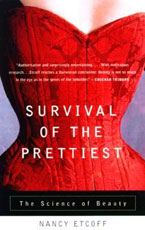Nancy Etcoff is a faculty member at Harvard Medical School and a practicing psychologist at Massachusetts General Hospital. In this ambitious and wide-ranging paperback, she examines "what we find beautiful and why — what in our nature makes us susceptible to beauty, what qualities in people evoke this response, and why sensitivity to beauty is ubiquitous in human nature." Etcoff uses the latest research in cognitive science and evolutionary psychology as she explores the importance of beauty in diverse cultures.
Aristotle once noted: "Beauty is a greater recommendation than any letter of introduction." While many people still believe that we learn beauty preferences through acculturation, the author makes a good case that beauty is not in the eye of the beholder but rather is a biological adaptation. It is an instinct shaped by natural selection. She points out that even babies stare longer at attractive faces than at unattractive ones. Etcoff goes on to discuss the ways adults rate women and men for attractiveness.
It's no wonder, then, that women spend so much time on daily grooming and are encouraged to turn to the fashion industry to learn the latest clothes and accessories to make them look younger, taller, and wealthier. Over the years, men have taken more interest in personal appearance as well. Etcoff notes:
"Outside the realm of ideas, beauty rules. Nobody has stopped looking at it, and no one has stopped enjoying the sight. Turning a cold eye to beauty is as easy as quelling physical desire or responding with indifference to a baby's cry. We can say that beauty is dead, but all that does is widen the chasm between the real world and our understanding of it."
It is a sad and unjust state of affairs that beautiful people are given preferential treatment in our society and elsewhere. But there are noble souls who speak of another kind of glory such as George Eliot, the writer:
"All honour and reverence to the divine beauty of form! Let us cultivate it to the utmost in men, women and children — in our gardens and in our houses. But let us love that other beauty too, which lies in no secret of proportion but in the secret of deep human sympathy."
